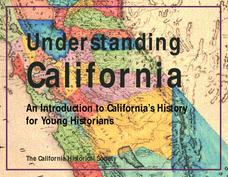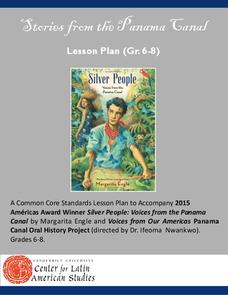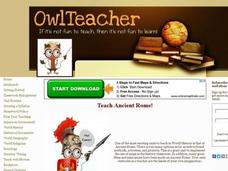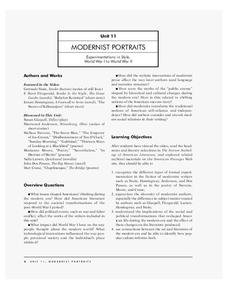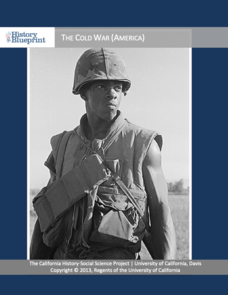Alabama Department of Archives and History
Extra! Extra! Read All About It?
Remember the Lusitania! As part of their study of the causes of World War I, class members examine newspaper articles and propaganda posters about the sinking of the Lusitania and then craft their own news story about the event.
Curated OER
Pocumtucks in Deerfield
As part of a study of colonial and Native American history, class members focus on the beliefs and land use of the Pocumtucks, who settled near Deerfield, Massachusetts. Students examine their beliefs about land use and ownership, the...
California Historical Society
Understanding California
Here is a beautiful handout through which learners can explore the history of California, from the earliest Europeans to visit the Golden State up through its experiences during the Great Depression and position in the modern world.
American Battle Monuments Commission
The Strategic Bombing Campaign
An extensive look at World War II details the strategic bombing campaign of the Allied forces. Beginning in September 1939 and ending in May 1945, the interactive map follows British and American forces throughout the bombing campaigns...
Miama-Dade County Public Schools
African Americans and the Civil War
The American Civil War is the theme of this packet of materials prepared for Black History Month. Class members learn about the roles that African Americans played during the Civil War and examine the African-American experience after...
Vanderbilt University
Stories from the Panama Canal
The stories of the Silver People, the West Indies immigrants hired to work on the Panama Canal, come to life in a lesson about the building of the Panama Canal. Groups research why the canal was built, how it was build, the working...
Maryland Department of Education
The Concept of Diversity in World Literature Lesson 9: Debating Imperialism
To gain an understanding of Imperialism, class members read Rudyard Kipling's poem, "The White Man's Burden" and Mark Twain's essay, "To the Person Sitting in Darkness." Groups compare these perceptions of non-white cultures with the...
Annenberg Foundation
Exploring Borderlands
What motivated Europeans to explore the New World, and what effects did their exploration have on Native American populations? The second installment of a 16-part American Passages series prompts pupils to watch a video and read several...
Owl Teacher
Teach Ancient Rome!
Teaching the class about Ancient Rome can be fun for you and for them! Check out this incredible resource that has everything you need to bring ancient Roman civilization back to life. Begin by scrolling to the bottom of the page and...
Global Oneness Project
The Value of Ancient Traditions
Imagine having to give up cell phones, computers, and TV? What would be lost? What gained? An examination of the Drokpa, a nomadic people who live in the grasslands of Tibet, provides class members an opportunity to consider how access...
Annenberg Foundation
Utopian Promise
Scholars learn all about the Puritans in the third installment of a 16-part lesson series. After watching a video, they read and discuss biographies of Puritans and Quakers from American history, write journal entries and poetry, and...
Annenberg Foundation
Modernist Portraits
How did literature reflect people's attitudes in post-World War I America? A lesson explores the topic using a variety of activities. Individuals watch and respond to a video; read author biographies and engage in discussion; write...
Core Knowledge Foundation
Genetics and the Master Race
How did the beginnings of genetic research influence the Nazi party? A thorough, engaging unit incorporates the work of Gregor Mendel, the study of inherited traits, and the use of racism and discrimination during the Holocaust.
Dick Blick Art Materials
Stitch It Up!
Ever think about combining the art forms of painting and embroidery? Then this art instructional activity is right up your alley! Given a piece of white cloth, young artists first create a grayscale painting and then highlight certain...
Dick Blick Art Materials
No-Blender Pulp Painting
Like finger painting, this project is very tactile. Kids tear tissue paper into small pieces, add water, and mix up a pulp that can be pressed onto a canvas to create a colorful, textured painting.
Brooklyn Children’s Museum
Inside India
What can a Ganesh statue, hand ornament, and print block tell you about India? Introduce your learners to the geography, history, and culture of India by analyzing primary sources and using the well-designed worksheets provided in this...
University of California
The Cold War (America)
The Cold War—with its roots in World War II—impacts the world today. Using an extensive curriculum, scholars consider its impact through primary sources, including speeches and propaganda, as well as other skills-enhancing activities. An...
Speak Truth to Power
Elie Wiesel: Speaking Truth to Genocide to Power
Invite your learners to discover the efforts of Night author Elie Wiesel to promote awareness of genocide in the world. After watching and reading an interview of Elie Wiesel, high schoolers work to create a living Holocaust museum by...
School District of Palm Beach County
Timelines
What do BC and AD mean on a timeline? What is the difference between a decade and a century? Here is a nice handout that offers all the foundational knowledge your young historians will need on how to look at historical timelines.
Miami-Dade County Public Schools
Veteran's Day—Honoring All That Served
Looking for ideas on ways to recognize Veteran's Day? Check out this 92-page packet that includes exercises designed for all grade levels. Reading passages detail the history of the holiday, research projects get individuals involved in...
California Polytechnic State University
Australian Geography Unit
At the heart of this resource is a beautifully detailed PowerPoint presentation (provided in PDF form) on the overall physical geography of Australia, basic facts about the country, Aboriginal history, and Australia culture and lifestyle.
American Institute of Physics
African Americans and Life in a Secret City
Imagine the lure of being offered a job at a secret site, working on a secret project, and earning higher wages! Such was the approach used to recruit African Americans to Hanford, Washington, one of several sites used to develop...
University of California
Principles vs. Practices
Have you ever wondered what your own World Order would look like? Scholars use primary and secondary documents as well as video clips to investigate and analyze the Cold War. Using the sources, the principles and practices of nations...
Los Angeles Unified School District
River Systems
Scholars must react to the ecosystems of a river. They use inquiry-based learning along with maps and visuals to better understand the impact of rivers on everyday life. To finish, they create final written projects and presentations.




